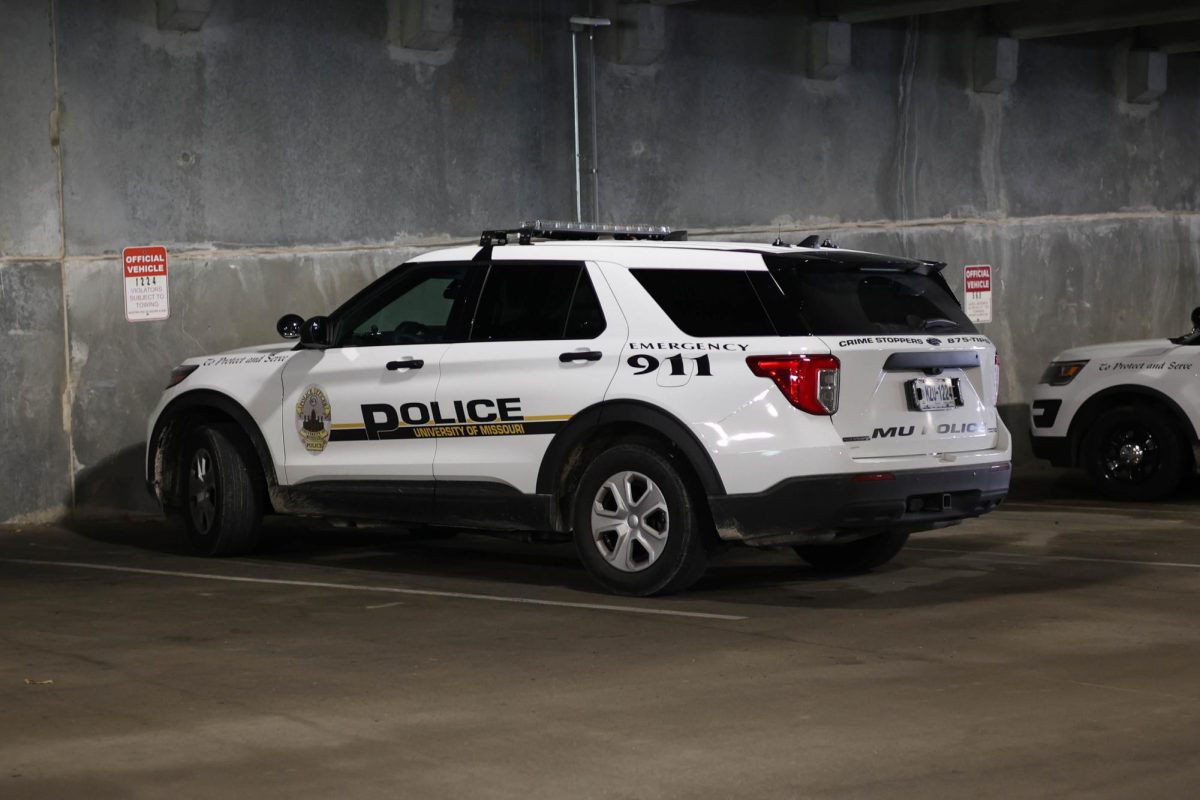Meg Miller’s social media post follows a long history of racist incidents on campus, most recently including the posting of white supremacist flyers on MU’s campus.
Update: On Dec. 14, Mizzou Students for Life told The Maneater that Megan Miller is no longer a member of its executive board as of Dec. 8 with the following statement:
“Mizzou SFL believes all life is valuable and rejects prejudice against people based on age, sex, race, stage of development, perceptions of abilities, or income.”
On Dec. 7, a screenshot was posted in a group chat between many Black students on the MU campus. The screenshot displayed an alleged Snapchat post of MU student Megan Miller using a racial slur and promoting violence toward Black people, and it quickly circulated via social media. It is unknown when the post was originally created.
According to Miller’s LinkedIn, which has since been deleted, she served as the president of the MU chapter of Turning Point USA but resigned “without explanation” last week, as reported to The Kansas City Star from the national branch of Turning Point USA.
In the same correspondence with the Kansas City Star, TPUSA stated, “this kind of language has no place at TPUSA, and we support her decision to remove herself from all involvement with that local chapter.”
Miller also acted as the vice president of public relations for Mizzou Students for Life. It is unclear whether Miller will continue to serve in that position, as MUSFL has not responded to The Maneater’s request for comment.
Jeremiah Jordan, the executive adviser of the Black Collegiate Network, said it was disheartening to see the post, especially coming from a student who had executive positions on campus.
“A lot of us want to call Mizzou home,” Jordan said. “A lot of us have our best friends here and have met many great people here. But then there’s the flip side of that — we have so much racism and so much hate speech spewed all over campus at all times. It’s scary to think about all these people going around hating, hating us for our color and for literally no reason at all. They don’t even know who we are.”
Jordan frequently witnesses what he describes as routine acts of racism on campus, with some of these incidents having affected him firsthand.
“A lot of the experiences I’ve had deal with microaggressions, like people trying to touch my braids,” Jordan said.
According to Jordan, many people on the MU campus have had similar experiences. In 2020, many Black students shared their experiences with racism and microaggressions on campus through the hashtag #blackatmizzou.
“It’s gross to think that it’s a normal occurrence at Mizzou,” Jordan said.
Additional screenshots from Miller’s now-deleted Instagram page show her at a Turning Point USA conference standing with Kyle Rittenhouse, who shot three men on Oct. 25, 2020 at a Black Lives Matter protest in Kenosha, Wisconsin.
“[The post] made me really uncomfortable, especially because the caption was something like ‘best day of my life’,” said Kaylyn Walker, who serves as a Senator with the Legion of Black Collegians. “It was really uncomfortable for me, especially as a person of color.”
Miller’s post is currently under review by the Office of Institutional Equity, according to MU News Bureau Director Christian Basi. As explained by Basi, the process entails contacting all involved individuals and investigating the context of the post.
An MU press release condemned the post and said that following the review, the university will take immediate action.
“The language is reprehensible, and we condemn any language and actions that are racist, discriminatory, and hateful to our community,” UM System President and MU Chancellor Mun Choi said.
Some students have expressed concern that the report will eventually be dismissed.
“I have friends that have filed reports [to the Office of Institutional Equity] and it has not been taken seriously. No type of realistic action has been taken,” said Walker. “I know a lot of people who have been in that situation and don’t really feel like going through the process just to be disappointed once again.”
Miller’s post comes after another instance of white supremacist displays on MU’s campus earlier this semester.
On Oct. 24, posters were put up around campus displaying white supremacist rhetoric and using the “14 words,” a known dog whistle within white supremacist spaces. The posters also included links to a white power website.
In response to the posters, students formed Mizzou Fails, a coalition that presented a three-tiered list of demands to the administration. Upper-tier demands advocated for the diversification of MU faculty and other infrastructural changes. Tier-one demands called for MU to launch an investigation into the posters, to punish the individuals responsible for their creation and distribution, and finally, for Choi to issue a statement denouncing white supremacy and apologize to students for not acting sooner.
On Nov. 10, Choi responded with an email condemning racism and discrimination, but there was no direct acknowledgment of the posters nor explicit condemnation of the content they promoted.
The MU Faculty Council, an elected representative organization of MU professors, released a statement on Nov. 10 in which it condemned the content of the posters and acknowledged that the messages were inconsistent with MU’s values.
According to the statement, “While posting the flyers may not violate university policies on free speech, it is important to acknowledge that the flyers display messages of hate, which have been associated with a history of racist violence in the U.S.”
Four days later, a protest organized by MU students Alana Hayes and MarKeia “Nova” Kellogg was held in Speakers Circle to urge MU to formally condemn white supremacy and to take preventative measures against racial discrimination on campus.
The MU administration did not issue any statements condemning white supremacy or the posters as demanded by protestors.
“This isn’t one and done – there’s work that needs to be done on this campus,” Walker said.
Walker believes combined momentum from recent protests and the outrage from Miller’s post can aid in creating a positive change on campus, but knows momentum alone isn’t enough. Walker said MU needs to focus on diversifying its faculty and executive board. According to data from MU Analytics, as of 2021, 4.13% of tenured MU faculty were identified Black.
“A lot of people don’t feel the comfort that they need to go to faculty or staff about these situations, because a lot of times they don’t have a Black professor, or a Black dean, or a Black ambassador, or anything,” Walker said.
Calls for a more diverse faculty were present in Mizzou Fails’ upper-tier demands as well as the demands issued in 2015 by Concerned Student 1950, a student organization formed in 2015 after a string of racist incidents on MU’s campus. CS1950’s demands called for a series of administrative efforts aimed toward a more equitable campus — most notably the removal of then-UM System President Tim Wolfe.
The demands were delivered in tandem with protests, including a hunger strike by MU student Jonathan Butler, a refusal to play by MU’s football team, and mass sit-ins and boycotts by students.
CS1950 founding member Maxwell Little believes few strides have been made following the 2015 efforts.
“It depends on how you measure change and how you look at what’s changed,” Little said. “From a structural and institutional perspective — no, there hasn’t been change when you look at the list of demands that [CS1950] had.”
According to Little, Miller’s action reflects poorly on the university’s progress.
“Hate speech impacts not just the students but the campus as a whole,” Little said. “MU has been trying to rebuild its brand since 2015. So if they are in the rebuilding of the brand, they should take immediate action to make sure nothing like this continues to happen.”
As the committee reviews Miller’s case, many are calling for MU to take actionable steps to prevent future incidents. Students hope to see Miller’s immediate removal from leadership in MU’s Students for Life following her resignation from MU’s Turning Point USA.
“Forcing her to step down from leadership positions would send a message to other racists on campus … it would show them that their actions have consequences,” Jordan said.
Additionally, many feel that expulsion from MU is necessary.
“[Expulsion] is a very serious thing, but when she’s making a comment about African Americans, I really do think that is a very serious action that needs a very serious consequence,” Walker said.
In addition to consequences for Miller, Walker said she wants to see intentionality and transparency within the MU administration.
“I feel like more than anything, just a personal email, that’s not auto-generated and is coming from a person who’s actively investigating this case, would be really helpful to know exactly how the institution is handling this situation,” Walker said. “So we know they’re not putting it aside and just saying they’re investigating the case.”
As the investigation continues, Walker hopes Miller’s case committee takes the proper steps to address and prevent acts of racism at MU. She asks, “What are you doing to actively combat racism, prejudice, and microaggression on this campus, not just when there are specific instances, but every single day? Where do your priorities lie when it comes to racism and prejudice on this campus?”
Edited by Emma Flannery | [email protected]
Copy edited by Mary Philip













